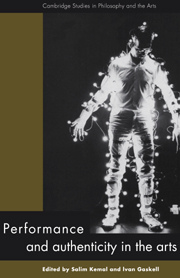Book contents
- Frontmatter
- Contents
- List of Contributors
- Editors' Acknowledgments
- 1 Performance and authenticity
- Part I Performance, religion, and authenticity
- Part II Understanding, performance, and authenticity
- 5 Understanding music
- 6 Understanding music
- 7 Musical performance as analytical communication
- 8 Performance authenticity possible, practical, virtuous
- 9 Why is it impossible in language to articulate the meaning of a work of music?
- Part III Authenticity, poetry, and performance
- Index
5 - Understanding music
Published online by Cambridge University Press: 12 November 2009
- Frontmatter
- Contents
- List of Contributors
- Editors' Acknowledgments
- 1 Performance and authenticity
- Part I Performance, religion, and authenticity
- Part II Understanding, performance, and authenticity
- 5 Understanding music
- 6 Understanding music
- 7 Musical performance as analytical communication
- 8 Performance authenticity possible, practical, virtuous
- 9 Why is it impossible in language to articulate the meaning of a work of music?
- Part III Authenticity, poetry, and performance
- Index
Summary
Most people who care a lot about music would nonetheless be hesitant in claiming to understand it. Their hesitation has several sources. In the first place, they know that there is a great deal of musical theory, though they are likely to be vague about what it consists of; they may know that there are competing musical theories, and wonder what they compete about. Second, they know that there is an enormous amount of musical terminology which is to a large extent independent of, or common to, opposed musical theories, but which again they have at best only a tenuous grasp of. Or, to move to a slightly more sophisticated sub-set of music-lovers, they know quite a range of musical terminology but are not able to apply it to pieces of music they know or even play. And thirdly, they are made most uneasy by the fact that their responses to music are articulated, if at all, in terms which may very roughly be designated “emotional,” and that there seems to be an unbridgeable gap between talking about music in the way that they do and talking about it in the way that, for example, Donald Francis Tovey, or Charles Rosen, let alone the awe-inspiring Heinrich Schenker, most characteristically do, though none of those authors eschews emotion-language completely. But such writers contrive to give the impression, though it may not be wholly intended, that one's only right to use emotion-terms comes as a result of the kind of purely musical understanding which they manifest.
- Type
- Chapter
- Information
- Performance and Authenticity in the Arts , pp. 97 - 113Publisher: Cambridge University PressPrint publication year: 1999
- 1
- Cited by



